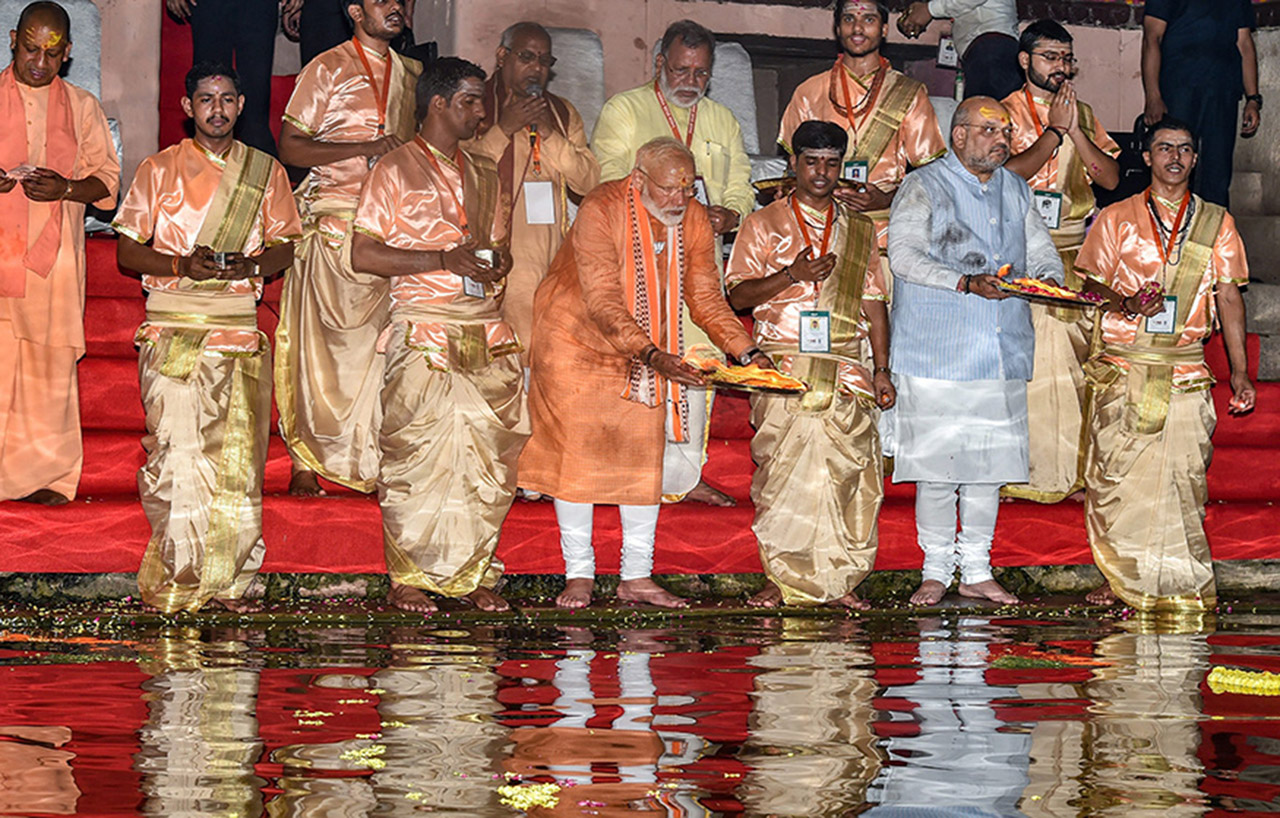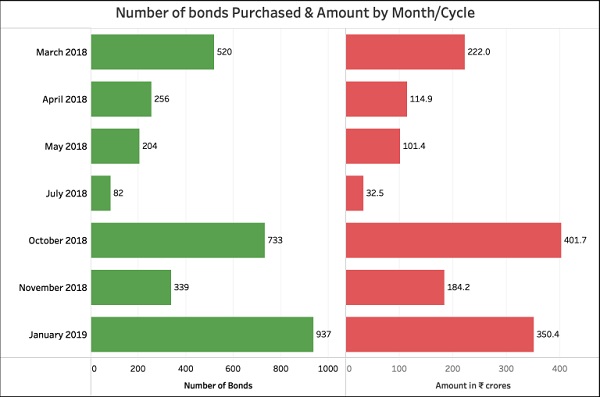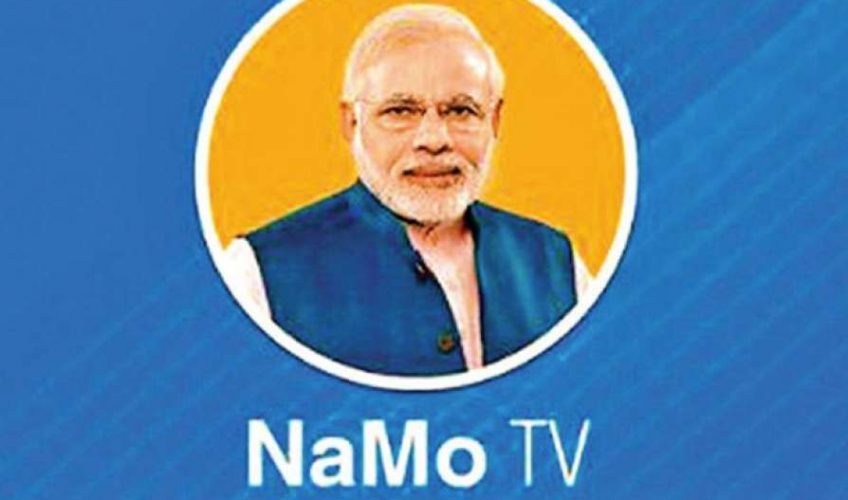The ongoing 2019 elections have already marked a watershed moment in the history of Indian parliamentary democracy. Big democracies across the world are on the verge of neo-fascist takeovers, and India is no exception to this trend, with its “Viraat Hindu” leader brazenly violating multiple laws and codes established by the Constitution in order to retain office. While fascist leader Narendra Modi is trying everything possible to establish his personal control over the nation and its law, our constitutional institutions are buckling. Siddhartha Dasgupta writes.
In what has become a scandalous Elections with several complaints being filed for violation of the Model Code of Conduct (MCC) on the top leader of the country, Narendra Modi and his party machinery are leaving no stones unturned to convert the 2019 elections into one that is solely about himself. According to an NDTV study of half of Narendra Modi’s rallies over the past one month, the most often used word in his speeches was “Modi” itself. The Prime Minister referred to himself 199 times. As compared to this, “BJP” was mentioned 106 times, “Vikas” 70 times, “Pakistan” 51 times, and “Jobs” only 7 times. Modi has been repeatedly saying in his speeches, “Pressing the Lotus button is synonymous with a vote for Modi”. BJP candidates everywhere are themselves openly asking votes in the name of Modi, with no attempts or pressures to even talk about themselves as candidates. “Modi nahi toh kaun?” is their main defense to almost any question thrown at them.
3 critical moments to recall
While citizens of the country are expected to vote, thereby discharging their constitutional responsibilities, the Constitutional bodies such as the Election Commission of India (ECI) are entrusted with ensuring that the elections are free and fair and that the candidates adhere to a code of conduct. The ECI seems to have fled the scene, and is guilty of dereliction of duty. In a recent article in India Today (Hindi), editor Anshuman Tiwari points to three critical moments in the build up to the elections.
First. The Attorney General’s statement to the Supreme Court that the public have no right to know who is funding which political parties through recently introduced financial instruments called “Electoral Bonds”. The Supreme Court in response asked each party to submit the details of who purchased their bonds in sealed envelopes, but by May 30! The elections would be over by then. From March 2018 to January 2019, a total of 3071 bonds had been purchased, amounting to a total value of ₹1407 crores. Last year, of the overall ₹221 crore worth of Bonds, the BJP alone received ₹210 crore, the Congress received ₹5 crore and all the rest of the parties put together received ₹6 crore. However, neither the Government (or rather, the ruling party) nor the Supreme Court of the country thinks that the poll-bound voters have a right to know which corporate owners are paying how much to their political parties and candidates through expensive bonds costing ₹46 lakhs on average.
Second. In September 2018, a 5-judge bench of the Supreme Court asked the Parliament to frame a “strong law” to prevent people with criminal charges against them from contesting elections and entering the Lok Sabha. The court observed that decriminalisation of politics should begin by “cleansing” political parties. The government, and to be fair the entire Parliament, did not even respond to the court order. Incidentally, during his 2014 campaign, at a rally in Hardoi, Narendra Modi had himself said that once he gets elected, he will set up a committee to run investigations on sitting MPs with criminal records and take the findings to the Supreme Court to banish those with proven criminal charges from the Parliament, reminds Anshuman Tiwari.
Third. In the same judgment, the Court had instructed the Election Commission that at the very least, the EC must print the details of criminal charges faced by candidates with criminal records as full front page advertisements in corresponding leading regional newspapers, after the filing of candidatures. Around 34% of the current Lok Sabha MPs have declared criminal cases. The EC did not follow this order either, and prior to the elections the Supreme Court issued a notice of Contempt of Court to the EC for this violation.
When an already criminal network finally succumbs to the Criminal-in-Chief
According to the latest report posted by the election watchdog organisation Association for Democratic Reforms, of the 5378 candidates from the 4 phases conducted so far, 19% have declared criminal cases against them. 76 candidates have been charged with cases of violence against women. 69 candidates have been charged with cases relating to hate speech. While 41% of the INC candidates contesting so far have cases, the BJP follows close behind at 38%. The nomination of Pragya Singh Thakur, one of the accused in the 2008 Malegaon blast case, has been described as a “whole new level” by many. But as we know, Narendra Modi himself was accused of pogroms against Muslims in Gujarat in 2002, and is currently the Prime Minister of this country.
Prime Minister Modi has been blatantly trampling all over the Moral Code of Conduct and the Representation of People Act (1951) in the ongoing elections. The NaMo TV, which uses PM Narendra Modi as its logo and has been promoted by the official BJP Twitter handle and individual ministers, is still running Modi’s propaganda uninhibitedly, without any pre-approval or license, and even after the EC issued a notice to the Information and Broadcasting Ministry over the channel. According to The Wire, “this is the first time a special service channel has been launched across multiple DTH platforms such as Tata Sky, Airtel and Dish TV, the last of which is owned by Rajya Sabha MP Subhash Chandra.”
Modi’s direct violations of the Model Code of Conduct is as blatant as it is lengthy. On 23rd April, he conducted a spectacle of a rally after casting his vote in the Gandhinagar constituency. He also gave a speech. Both these acts were in violation of the “silence period” since voting was still going on. The Election Commission has sought a report from the chief electoral officer of Gujarat on the ‘roadshow’ based on a complaint filed by the Congress party. In spite of restrictions imposed by the EC, the NDTV counted him mentioning Airstrike/Pulwama/Balakot as many as 35 times in 35 of his rallies. In Maharashtra’s Latur, in what has been described as a direct appeal to communal emotions for votes, he asked people to vote against those who have coined the term “Hindu Terror”. In the same rally held on April 9, Modi openly asked the first time voters, “Can your first vote be dedicated to those who carried out the air strike?”
Yet none of this prompted the EC to act. His Varanasi road show and religious ceremony at the river, broadcast across the media, was a truly ostentatious and vulgar display. Around 1.4 lakh liters of drinking water were used on the night before Modi’s show to wash the roads of Varanasi – a city where over 30 per cent of the population goes without piped water. The Telegraph quotes a city official saying, “We had instructions to wash the roads for the Prime Minister.” Tonnes of rose petals were showered across the city in a clear show of the amount of money that has been pumped into these elections. According to some reports, Narendra Modi is planning yet another mega event – a “visit” to Ayodhya – on 1st May.
From 1970s to 2010s: The crumbling of Indian “democracy”
In another general election, more than 50 years ago, the opposition candidate took the then sitting Prime Minister to Court alleged electoral violations. The famous “Raj Narain Case” that was filed first at the Allahabad High Court and then reached the Supreme Court, held then PM Indira Gandhi guilty of violating the Representation of People’s Act. The charges: using district administration officials for setting up stages and rostrums for the PM’s election rally, using a religious symbol (ironically, a cow with a calf) in her campaigns, etc. The Supreme Court in its order not only invalidated her candidacy, but also “disqualified her for a period of six years” from holding elected office – and thus, from being prime minister. This order led her to declare the “National Emergency” in a bid to save her PMship. This was the beginning of the end.
Today, the Prime Minister of the country does not need to declare an emergency anymore, since the constitutional institutions that were supposed to challenge him and hold him accountable have already succumbed. Section 123 of the Representation of People’s Act, 1961 prohibits asking for votes through “Promoting feelings of enmity or hatred on grounds of race, caste, community or language.” Section 126 of the Act states that “No person shall — convene, hold, attend, join or address any public meeting or procession in connection with an election … in any polling area during the period of forty-eight hours … for any election in that polling area.” The Prime Minister has been repeatedly violated these sections of the Representation of People Act till date, and with impunity. Earlier this month, the Scroll.in published an investigative report where they produced an email sent from the NITI Aayog, the Central government think-tank, asking bureaucrats to provide the Prime Minister’s Office with information about destinations Narendra Modi would be visiting on the campaign trail. This evidence, if confirmed, could mean that PM Narendra Modi’s violation of the Representations Act is similar to that for which PM Indira Gandhi was convicted.
The PM is not alone in this, neither are the BJP candidates. All electoral political parties in India have made it a routine affair to violate the Model Code of Conduct or the Representation of People’s Act. However, alarm bells should go off when the Prime Minister and the most powerful political figure of the country conducts spectacles around breaking such laws, and the constitutional institutions back down under the pressure.
Elections in India have always been a matter of dirty money, but the 2019 elections have taken things to a different level already. The total value of seized gold, drugs, cash and liquor, meant for bribing voters, doubled from $172 million in 2014 to $365 million by April 14, 2019 when the elections had merely begun.
Where is the Election Commission of India?
While the Election Commission website lists cases registered against smaller offenders for things like distributing lunch packets to party workers in some constituency, it has no listed record of complaints against the Prime Minister even though thousands of complaints filed with the EC have named him as an offender. Though it has issued notices to various other agencies around Narendra Modi, it has not directed one letter against the man himself.
Serious allegations have also been raised against the EC about its role in the ongoing EVM controversy. While the EC insists that EVMs can’t be tampered with, a section of parties and voters have been raising concerns about EVM manipulations throughout the elections. Kapil Sibal, lawyer for the Opposition in the ongoing EVM case in the Supreme Court, has alleged that the statistical report used by the EC to justify its current random counting process, is not in fact a study conducted by the Indian Statistical Institute, contrary to what the EC had been claiming. Sibal mentioned an RTI response revealing that the ISI was not even involved in the statistical exercise undertaken in March. The report was co-authored by an ‘Executive Committee’ consisting of Prof. Abhay Bhatt (ISI Delhi), Prof. Rajeev Karandikar (Chennai Mathematical Institute), and a representative of the Central Statistics Office, Ministry Of Statistics and Programme Implementation. GX could not find any copy of the report titled “Random Sampling For Testing of EVMs via VVPAT Slip Verification” on the ISI website, or the homepages of Prof. Abhay Bhatt or Prof. Rajeev Karandikar, or on the website of the Central Statistics Office. Opposition parties are claiming for a count of 50% of the VVPAT machines. Voter Verifiable Paper Audit Trail (VVPAT) machines are used during election process to verify that the vote polled by a voter goes to the correct candidate. VVPATs are a second line of verification and are meant specifically for verifying whether the EVM is malfunctioning.
On top of everything else, the law itself has been designed in order to discourage people filing complaints about mismatch in their votes and the VVPAT slip. A former DGP in Assam said he saw the VVPAT print a slip with a name different from the candidate he had voted for, but did not file a formal complaint because the Presiding Officer told him his vote could not be cancelled, and if his complaint was proved to be false he could face as long six months of imprisonment or 10,000 Rs fine.
We are on our own
Historic and once-powerful constitutional institutions of the country such as the Supreme Court and the Election Commission has caved in under the rise of India’s first fascist national patriarch in Narendra Modi – one who is above any law, and who a large section of people think should be beyond any law of the country. At this crucial juncture in the country’s history when its Constitution is being publicly demolished by fascist forces, not subtly but as a rather spectacular takeover, its constitutional institutions appear to be in no position to offer any kind of moral or political resistance. It will be interesting to see what stance the Supreme Court takes during hearing of a petition filed by Congress Party that accuses the EC of continued silence on numerous complaints about hate speeches and dragging in the name of armed forces for seeking votes during campaigning by Prime Minister Modi and BJP president Amit Shah.
The people of this country seem to be faced with a task much bigger than deciding whom to vote for the upcoming Lok Sabha. It is time to rethink the very framework of “democracy” in this country, under the garb of which accused terrorists can run for public office and win elections, while none of its watchdog institutions even whimper. It is time for the masses to rise up against the fascist forces to reclaim, reconstruct and rebuild a real democratic society and politics.
Siddhartha Dasgupta is an activist and freelance jounalist.
Cover Image : Prime Minister Modi taking part in ‘Ganga Aarti’ at Varanasi before filing his nomination paper.





